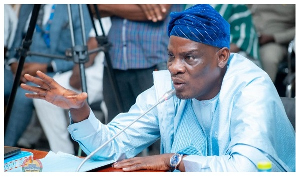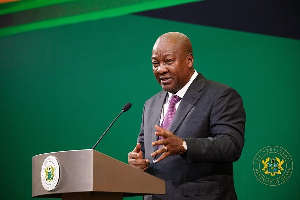Over the past year there have been a lot of discussions and newspaper articles on the government’s proposal to privatize the water supply system in the country. Water supply, like power supply has three main aspects - lifting and treatment (generation), transmission, and distribution. These apply mainly to municipal water systems. Added to the municipal systems is the rural water supply systems which, in Ghana, consist mainly of shallow boreholes fitted with hand pumps, hand-dug wells, streams (permanent and ephemeral), springs, and ponds. Personally, I do not know which of our water supply systems are slated for privatization, and I am also not sure if it is necessary. Our municipal water systems are crying for the infusion of capital for major improvements and expansion to meet the ever-increasing populations. This has come about as a result of a lack of vision and integrated comprehensive planning on the part of city and utility planning managers.
The alleged mass corruption in the award of contracts and procurement of materials revealed in the recent auditing of the Ghana Water Company (GWC) shows the lack of fiscal discipline and proper management in the water supply sector. There is a lack of maintenance culture in our system and it is not uncommon to find water wastage from leaking pipes around the city and nobody seems to care.
This, coupled with unauthorized tapping of water from transmission pipes in certain neighborhoods lead to the loss of millions of cedis. Our bill paying culture is also poor and our address system makes it very difficult for bill collection from defaulters. These are just a few of the problems faced by utility organizations in our society that need to be changed if we want a reliable delivery system.
What role is there for private enterprise in supplying water to the Ghanaian public?
The question evokes fear of the kind of corporate profiteering and market manipulation observed in the wake of Enron and Worldcom bankruptcies in corporate America. Proponents of privatization will argue that private companies will be more efficient in the management of the water resources. I beg to differ because most of the few problems enumerated above will not be overcome overnight by the involvement of the private sector because most of the employees and the customers will still be Ghanaians. What we really need is a change of attitude and work ethics of the Ghanaian worker and the way we use water. In addition, there is the need to appoint people with vision to run the water sector, people with experience in building the necessary facilities when needed without necessarily raising rates.
Generation of Capital:
It is true that the private sector may be able to immediately inject capital into the operations of the water sector. With the right leadership and an appropriate resource planning, however, a public entity should be equally capable to raise capital for infusion into the water sector through bonds and other prudent measures. For instance, a charge of C10.00 per customer can be added to customers’ bills for a period of about 12 months for a specific project to improve water treatment and make the delivery system more reliable. Such surcharges can be put into a separate account to build a facility when needed without raising rates.Conservation and Price Elasticity
Water conservation should be critical (especially in the urban areas) to the country’s integrated resource planning efforts. Public education on the reduction in peak dry season water usage is very necessary.I am an advocate for the reuse of wastewater but our current sewage treatment facilities do not allow for that alternative as a conservation method. Consideration must however be given to rainwater harvesting into aluminum and concrete tanks as a viable conservation method. It is practiced to a lesser degree in the villages and district capitals.
It is common knowledge that increases in water price is the most effective ‘voluntary’ conservation measure. To avoid waste and encourage conservation, a tier system of billing can be implemented for water use. This system applies the same rate to say, the first 2000 gallons of water used by every household, a different (higher) rate for the next 2000 gallons, and another (higher) rate for the next 1000 gallons, etc. Such a system can raise more revenue and also encourage water conservation. To ensure a reliable water delivery system to match growth, realistic connection charges should be applied to new developments. Revenue accrued from these two processes can be used to pay for water expansion projects, thus balancing the interests of current and future customers.
Water as a natural resource:
Proponents of water privatization may say that water has been a commodity since water and money existed. My answer to that is no, sir. Privatizing water is a more sensitive issue given its stature as a natural resource essential for physical, as well as economic health. The dangers of cutting corners on water treatment and system maintenance for profit make it more difficult to give private companies a free hand in the management of a natural resource. As a natural resource that supports our physical well-being, its development must be regulated.I view the establishment of the Water Resources Commission (WRC) as a positive step in regulating and overseeing the water resources development of the country. The WRC should be tasked with the preparation of water resources plan every five years based on population projections. Such a plan should include, at a minimum, our current sources of supply, current water usage, and sources being considered to meet any future projected needs without any adverse effects on the environment.
In addition to its functions, I think the WRC has to find out whether or not we are getting enough flow (discharge) from the upper basin states of the Volta River Basin into the reservoir at Akosombo and subsequently, Kpong. It is true that drought conditions have affected the flow of the Volta River over the years and siltation of the reservoir has also reduced its volume but I believe it is about time that we (through the WRC) entered into some water rights agreements with all the basin states to determine how much each can use upstream and downstream based on the rainy season and dry season flows. I believe such an agreement will enable us get maximum benefits from the operations at Akosombo and Kpong for power and water supply respectively.
There have been a lot of drilling projects in the country since the 1970s and the WRC can serve as the clearing-house for data generated from these projects. I know that ground water is being used extensively in the rural areas but I do not know how it is being used in the urban centers to augment our reliance on surface water. (The dangers of over-pumping ground water is another issue that we may need to discuss at a later date).
Rural Water Systems:
I am not sure how the rural water systems are going to be privatized. The wells fitted with hand pumps and the hand dug wells have since long been provided by non-governmental organizations (NGOs) such as the World Vision International and British Water Aid and also through bilateral agreements between the government of Ghana and donor countries. The communities have become involved through some monetary contributions and the performance of certain rudimentary repairs and this gives them a sense of ownership. How is privatization going to work in these areas? Is the government going to leave the drilling and equipping of boreholes in these areas in the hands of the private businessman? I have been to a village where about 200 of the 400 residents were all afflicted with guinea worm. This was getting to the end of the dry season when they should be preparing the land for the rains to grow their yams but they were immobilized by the worm. I am not sure such a community would be able to raise any money a private businessman would request to provide water, though they realize they need water badly. The government has to help such communities to get up on their feet to enable them contribute to the economy.My Proposal:
Is privatization the solution? Instead of privatizing the water sector, I will advocate for a handing over of the systems to the various municipalities and districts to run them. The government can give a specified sum of money to each municipality every year for improvements based on the population served. The management team of the systems should be accountable to a board of directors consisting of elected municipal officers selected by the municipality or district. In this case, if the water system in say, Accra-Tema needs some improvements, residents in Accra-Tema will have to bear the cost and those in Cape Coast or Koforidua will not have to pay a dime for it. In this case, the various communities can plan and select the appropriate combination of resources, facilities and conservation programs for the expansion of their water systems to meet current and future water demands to accommodate population growth. Such a decentralization will undoubtedly also create jobs for the numerous graduates we are producing from a higher institutions.I believe we do not need a private businessman to help implement some of the suggestions given above. Meanwhile, the government should continue to help improve the water delivery systems in the rural areas. Water is too important to be left solely in private hands.
SNWA Resources
1900 E. Flamingo Road
Las Vegas, NV 89119, USA

Views expressed by the author(s) do not necessarily reflect those of Ghanaweb.


















